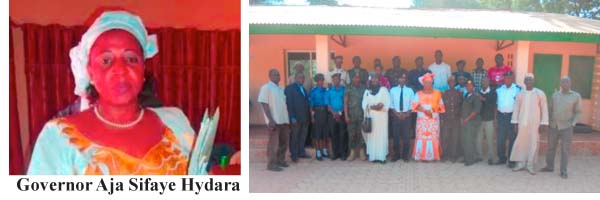
The Governor of the West Coast Region has said that ozone depletion is a serious threat to both human health and the environment.
Governor Aja Sifaye Hydara has, therefore, called for all to put hands on deck to prevent the entry of the banned substances into the country.
She made this statement while speaking at a two-day training workshop recently held at the Governor’s chamber in Brikama.
The Governor challenged the participants to take the responsibility in protecting the earth from substances and activities that deplete the ozone layer.
The workshop is part of a series of training activities being conducted by the National Environment Agency (NEA) on the detection and management of Ozone Depleting Substances (ODS) for customs, police, immigration and NIA officers, and other stakeholders throughout the country.
The training sessions on ODS-related issues are in line with the Gambia government’s commitments to phasing out the importation and consumption of ozone depleting substances, as enshrined in the Montreal Protocol of 1987 to which The Gambia is a party.
The training workshop is considered important as it avails the trainees the opportunity to acquire the necessary knowledge and skills on ODS detection at the nation’s borders, and the use of identifiers and safety procedures in handling these chemicals.
Governor Sifaye Hydara said the Gambia government has shown its firm commitment to phase out consumption of ozone depleting substances, by ratifying the Vienna Convention and the Montreal Protocol in May and June 1990 respectively.
She declared that ozone depletion poses a serious threat to both human health and the environment, and called for all hands to be on deck to stop the entry of banned substances into the country.
“This does not call for complacency, as there exists a high possibility of illegal smuggling and trade in ozone depleting substances (ODS), thereby posing a big challenge to curb the menace.”
Furthermore, she continued, the ozone layer which protects life on earth from ultraviolet B radiation is a very important resource for mankind and other living things on earth.
Governor Hydara noted that a depleted ozone layer leads to an increase in skin cancer, suppression of the immune system, reduction of crop yields and kills phytoplankton, the basic foodstuff of our marine creatures like fish, which could eventually lead to a drastic decline in the fish population throughout the world.
Speaking earlier, NEA’s senior programme officer, Aji Binta Kinteh, said the Gambia government ratified the Montreal Protocol in 1990.
President Yahya Jammeh signed into law the Ozone Depleting Substances Regulations in his capacity as Chairman of the Gambia Environment Management Council, Kinteh announced.
This move led to the successful phase out of all Chloro-Fluoro-Carbons (CFCs), from The Gambia by 31 December 2010, thereby decreasing the chances of ozone layer depletion, she added.
In ensuring that CFC phasing out is sustained, the National Ozone Unit of the NEA with support from the United Nations Environment Programme, has facilitated the formation of Refrigeration Technicians Associations in seven regions of The Gambia, and one thousand refrigeration technicians and hundred customs and other security officers have been trained and certificated.
These associations have also been provided with modern tools and equipment for the recovery of ozone depleting substances, as well as the retrofitting of old refrigeration appliances with ozone friendly refrigerants, she said.
To ensure a continuous monitoring of illegal trade of banned refrigerants, major customs entry points across the county have been supplied with refrigerant identifiers to test any suspected refrigerant canisters.
Alhagie Sarr, ODS co-programme officers at the NEA, said there is a need for both local and international efforts in saving the ozone layer from depletion.
The world being a global village, he said, the contribution from the security fraternity would no doubt be the greatest factor in reducing ozone depletion.
Sheikh Alkinky Sanyang, NEA’s environmental education and communication officer, said nature is at conflict with mankind and, therefore, appealed to participants to use their talents and skills to detect, deny entry and or confiscate banned refrigerants in the country.
He said sensitisation and awareness creation, using different media outlets to reach out to the grassroots on the protection of the ozone layer and the atmosphere as a whole throughout the country, including primary and secondary schools, is ongoing.


